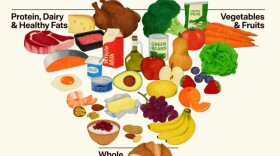-
During the two-day event at The Bake Lab, pastry chef Alex Peña will teach bakers the deep-rooted techniques of Mexican pastries like conchas, cuernos, elotes, chamucos, and more.
-
The 2026 U.S. Dietary Guidelines introduced an up-side down food pyramid that prioritizes meat, fats, and full-fat dairy. How healthy is this new food framework? We’re joined by Dr. Nate Wood, head of culinary medicine at the Yale School of Medicine and a former chef to talk about avoiding processed foods and eating healthy.
-
Americans' most loved Italian food staple could soon double in price or disappear from supermarket shelves following tariffs imposed by the Trump administration that could go into force from January.
-
As you prepare for your holiday feast, here's something to consider. Research suggests there are certain foods that can help boost our moods and make us happier in the long-run.
-
How did the Avocado become the toast of the nation? The humble tropical fruit is now common in supermarkets, but even in the 1980s many Americans had never seen an avocado, much less tasted one. How did this once obscure alligator pear come to occupy a central spot in American culture?
-
There's been debate among scientists and psychiatrists over whether people can be addicted to food the way they can be addicted to other substances like cigarettes and alcohol, and a consensus is emerging that yes, they can.
-
The evidence that ultra-processed foods are bad for us is piling up. But efforts to reduce their role in our diets face a big hurdle: experts can't agree on what they are and which to target.
-
The podcast's fifth season dives into taco culture, from the women who serve as the backbone of Mexican cooking, to the role that food can play in politics.
-
Mexican chef Pati Jinich and UT San Antonio's Amy Rushing talk about the signficance of the food and history highlighted in the collection.
-
Some food industry experts hope the state's law will play a role in influencing more federal regulation of food additives.
Play Live Radio
Next Up:
0:00
0:00
Available On Air Stations








